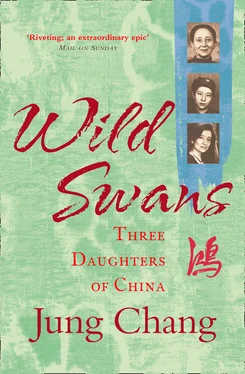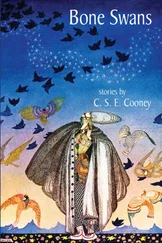At this point the underground advised its members to leave for the Communist-controlled areas. Those who did not want to, or could not leave, were ordered to suspend their clandestine work. The Kuomintang was clamping down fiercely, and too many operatives were being arrested and executed. Liang was leaving, and he asked my mother to go too, but my grandmother would not allow it. My mother was not suspected of being a Communist, she said, but if she left with the Communists she would be. And what about all the people who had vouched for her? If she went now they would all be in trouble.
So she stayed. But she was longing for action. She turned to Yu-wu, the only person left in the city who she knew was working for the Communists. Yu-wu did not know Liang or my mother’s other contacts. They belonged to different underground systems, which operated completely separately, so that if anyone was caught and could not withstand torture they could only reveal a limited number of names.
Jinzhou was the key supply and logistic centre for all the Kuomintang armies in the northeast. They numbered over half a million men, strung out along vulnerable railway lines and concentrated in a few shrinking areas around the main cities. By the summer of 1948 there were about 200,000 Kuomintang troops in Jinzhou, under several different commands. Chiang Kai-shek had been squabbling with many of his top generals, juggling the commands, which created severe demoralization. The different forces were badly coordinated and often distrusted one another. Many strategists, including his senior American advisers, thought that Chiang should abandon Manchuria completely. The key to any pullout, ‘Voluntary’ or forced, by sea or by rail, was the retention of Jinzhou. The city was only a hundred miles north of the Great Wall, quite near to China proper, where the Kuomintang position still seemed relatively secure, and it was easily reinforced from the sea—Huludao was only about thirty miles to the south, and was linked by a seemingly secure railway.
In spring 1948 the Kuomintang had begun to construct a new defence system around Jinzhou, made of cement blocks encased in steel frames. The Communists, they thought, had no tanks and poor artillery, and no experience attacking heavily fortified positions. The idea was to ring the city with self-contained fortresses, each of which could operate as an independent unit even if it was surrounded. The fortresses were to be connected by trenches six feet wide and six feet deep, protected by a continuous fence of barbed wire. The supreme commander in Manchuria, General Wei Li-huang, came on an inspection visit and declared the system impregnable.
But the project was never finished, partly due to lack of materials and poor planning, but mainly because of corruption. The man in charge of the construction work siphoned off building materials and sold them on the black market; the workers were not paid enough to eat. By September, when the Communist forces began to cut the city off, only a third of the system had been completed, much of it small, unconnected cement forts. Other parts had been hastily assembled from mud taken from the old city wall.
It was vital for the Communists to know about this system and about the disposition of the Kuomintang troops. The Communists were building up enormous forces—about a quarter of a million men—for a decisive battle. The commander in chief of all the Communist armies, Zhu De, cabled the commander on the spot, Lin Biao: ‘Take Jinzhou…and the whole Chinese situation is in our hands.’ Yu-wu’s group was asked to provide up-to-date information before the final attack. He urgently needed more hands, and when my mother approached him asking for work, he and his superiors were delighted.
The Communists had sent some officers into the city in disguise to reconnoitre, but a man wandering around the outskirts alone would immediately attract attention. An amorous couple would be much less conspicuous. By then, Kuomintang rule had made it quite acceptable for young men and women to be seen together in public. Because the reconnaissance officers were male, my mother would be ideal as a ‘girlfriend’.
Yu-wu told her to be at an appointed place at a particular time. She was to wear a pale blue gown and a red silk flower in her hair. The Communist officer would be carrying a copy of the Kuomintang newspaper, the Central Daily , folded into a triangle, and would identify himself by wiping sweat three times off the left side of his face and then three times off the right.
On the appointed day, my mother went to a small temple just outside the old north wall but within the defence perimeter. A man carrying the triangular newspaper came up to her and gave the correct signals. My mother stroked his right cheek three times with her right hand, then he stroked her left cheek three times with his left hand. Then my mother took his arm, and they walked off.
My mother did not understand fully what he was doing, and she did not ask. Most of the time they walked in silence, only talking when they passed someone. The mission passed off without incident.
There were to be more, around the city outskirts and to the railway, the vital communications artery.
It was one thing to obtain the information, but it was another to get it out of the city. By the end of July the checkpoints were firmly shut, and anyone trying to enter or leave was thoroughly searched. Yu-wu consulted my mother, whose ability and courage he had grown to trust. The vehicles of senior officers could go in and out without being searched, and my mother thought of a contact she might be able to use. One of her fellow students was the granddaughter of a local army commander, General Ji, and the girl’s brother was a colonel in their grandfather’s brigade.
The Jis were a Jinzhou family, with considerable influence. They occupied a whole street, nicknamed ‘Ji Street’, where they had a large compound with an extensive, well-groomed garden. My mother had often strolled in the garden with her friend, and was quite friendly with her brother, Hui-ge.
Hui-ge was a handsome young man in his mid-twenties who had a university degree in engineering. Unlike many young men from wealthy, powerful families, he was not a dandy. My mother liked him, and the feeling was mutual. He began to pay social calls on the Xias and to invite my mother to tea parties. My grandmother liked him a lot; he was extremely courteous, and she considered him highly eligible.
Soon Hui-ge started to invite my mother out on her own. At first his sister accompanied him, pretending to be a chaperone, but soon she would disappear with some flimsy excuse. She praised her brother to my mother, adding that he was their grandfather’s favourite. She must also have told her brother about my mother, because my mother discovered that he knew a lot about her, including the fact that she had been arrested for her radical activities. They found they had much in common. Hui-ge was very frank about the Kuomintang. Once or twice he tugged at his colonel’s uniform and sighed that he hoped the war would end soon so he could go back to his engineering. He told my mother he thought the Kuomintang’s days were numbered, and she had the feeling that he was baring his innermost thoughts.
She was certain he was fond of her, but she wondered if there might be political motives behind his actions. She deduced that he must be trying to get a message across to her, and through her to the Communists. The message had to be: I don’t like the Kuomintang, and I am willing to help you.
They became tacit conspirators. One day my mother suggested that he might surrender to the Communists with some troops (which was a fairly common occurrence). He said he was only a staff officer and did not command any troops. My mother asked him to try to persuade his grandfather to go over, but he replied sadly that the old man would probably have him shot if he even suggested it.
Читать дальше












